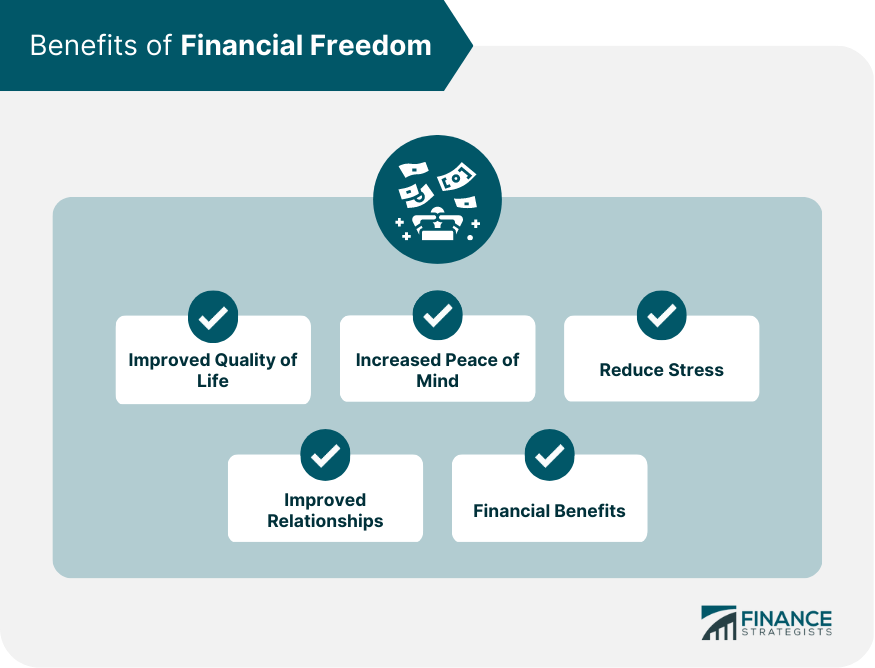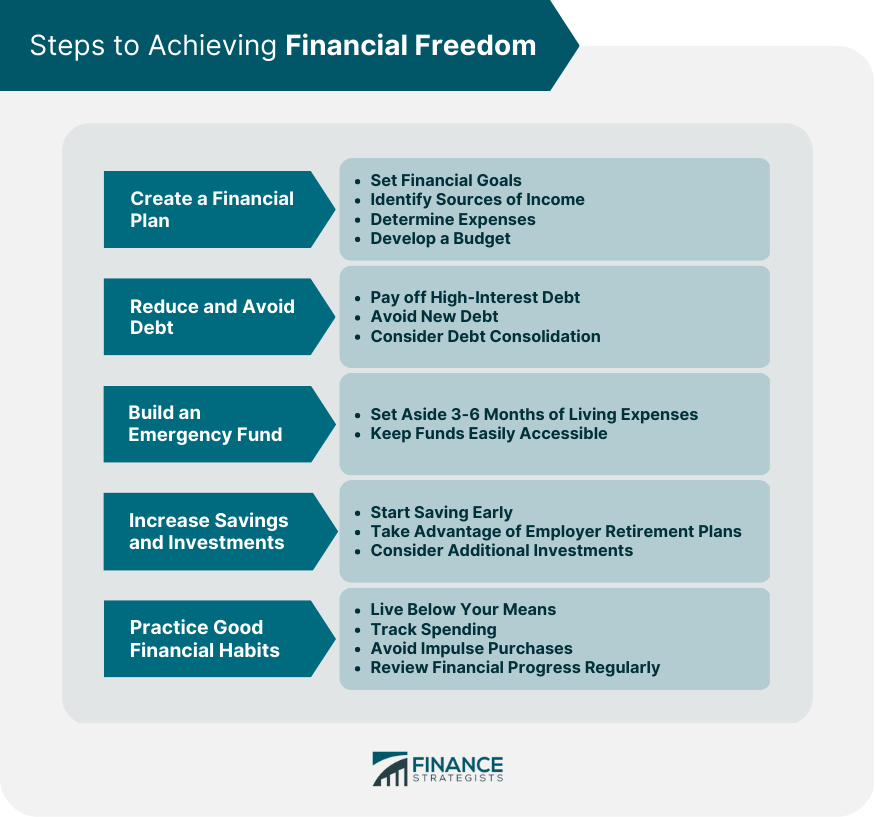Financial freedom refers to the ability of an individual to live a life free from financial worries, constraints, or limitations. It is a state of being where an individual has enough money to cover all their needs and wants without being enslaved by debt or having to work just for survival. Moreover, financial freedom allows individuals to make choices and live the life they desire without being limited by financial constraints. This means that individuals can take risks, make choices that align with their values, and pursue their dreams without worrying about financial barriers. Achieving financial freedom can also lead to improved mental and emotional well-being, as individuals are less likely to experience financial stressors that can cause conflicts and strains in relationships. Ultimately, financial freedom can lead to a more fulfilling and satisfying life. Achieving financial freedom comes with several benefits, both financial and personal. Here are some of the benefits of achieving financial freedom: Financial freedom allows individuals to pursue their passions, travel, and spend time with family and friends. Individuals can afford to take time off work and focus on personal growth and development. This leads to a more fulfilling and satisfying life. Knowing that you have enough money to cover expenses and emergencies can give your peace of mind. It can lead to better mental and emotional well-being, which can positively impact all areas of life. This reduces stress and anxiety and allows individuals to focus on other areas of their lives. Financial stress is a significant source of stress for many people, and it can have a negative impact on mental and physical health. It eliminates financial worries and concerns, allowing individuals to focus on other areas of their lives without the added stress of financial insecurity. Financial stressors can cause conflicts and strains in relationships. When individuals are financially free, they can afford to spend quality time with their loved ones without worrying about financial costs. This can lead to stronger, healthier, and more fulfilling relationships. Financial freedom allows individuals more control over their money, leading to better financial decisions. It also allows individuals to pursue investment opportunities that can lead to additional income and long-term financial security. Additionally, it enables individuals to save money and build wealth, leading to a more comfortable retirement and the ability to leave a financial legacy for future generations. Achieving financial freedom requires discipline, commitment, and a solid plan. Here are some detailed steps and tips on how to achieve financial freedom: A financial plan is a roadmap that helps individuals identify their financial goals and the steps needed to achieve them. Here are some components of a good financial plan: Set Financial Goals. Individuals must set clear and achievable financial goals to create a financial plan. These goals should be specific, measurable, attainable, relevant, and time-bound. Identify Sources of Income. This can include salary, investments, and other sources of passive income. Determine Expenses. Individuals should identify all their expenses, including fixed expenses such as rent or mortgage payments and variable expenses such as entertainment and dining out. Develop a Budget. Once individuals have identified their income and expenses, they can develop a budget. A budget is a plan that outlines how much money should be spent in each category. It helps individuals stay on track with their goals. Debt can hinder individuals from achieving financial freedom. Therefore, reducing and avoiding debt is crucial. Here are some steps that individuals can take to reduce and avoid debt: Pay Off High-Interest Debt. Individuals should prioritize paying off high-interest debt, such as credit card debt. This can be done by paying more than the minimum payment each month or consolidating the debt into a lower-interest loan. Avoid New Debt. Avoiding new debt is essential to achieving financial freedom. Individuals should avoid taking on new debt unless necessary, such as for a mortgage or car loan. Consider Debt Consolidation. This is an option for individuals with high-interest debt. Debt consolidation involves combining multiple debts into one loan with a lower interest rate. Building an emergency fund is crucial in achieving financial freedom. An emergency fund is a savings account that individuals can tap into in case of unexpected expenses, such as medical bills or job loss. Here are some steps that individuals can take to build an emergency fund: Set Aside 3-6 Months of Living Expenses. Individuals should aim to save three to six months of living expenses in their emergency fund. This can be done by setting aside a portion of their income each month. Keep Funds Easily Accessible. Emergency funds should be easily accessible in case of an emergency. Individuals can keep their emergency funds in savings or money market accounts. Here are some steps that individuals can take to increase their savings and investments: Start Saving Early. The earlier individuals start saving, the more time their money has to grow. Individuals can start by saving a small percentage of their income each month and gradually increasing it over time. Take Advantage of Employer Retirement Plans. Employer retirement plans, such as 401(k) plans, are an excellent way to save for retirement. Individuals should take advantage of these plans and contribute as much as possible. Consider Additional Investments. Individuals can also consider additional investments, such as stocks, mutual funds, or real estate. It is important to review and adjust investment strategies regularly to ensure that they are aligned with financial goals. Finally, practicing good financial habits is essential for achieving financial freedom. Here are some habits that contribute to financial freedom: Live Below Your Means. To live below your means is to spend less money than you make. This approach helps you avoid spending too much and allows you to save more money to achieve your financial objectives. Track Spending. Tracking spending is essential in understanding where money is going and where expenses can be cut. Individuals can use a budgeting app or spreadsheet to track their spending and identify areas where they can cut costs. Avoid Impulse Purchases. Avoiding impulse purchases is another essential habit to practice. Individuals should take the time to consider whether a purchase is necessary and aligned with their financial goals before making it. Review Financial Progress Regularly. Regular reviews can help individuals make necessary adjustments to their financial plans and investment strategies. Financial freedom is a concept that refers to the ability of an individual to live a life free from financial worries, constraints, or limitations. Financial freedom allows individuals to pursue their dreams, take risks, and make choices that align with their values. It also means that individuals do not have to worry about financial insecurity, which can cause stress, anxiety, and health problems. To achieve financial freedom, individuals must create a financial plan, set financial goals, identify sources of income, determine expenses, develop a budget, reduce and avoid debt, build an emergency fund, increase savings and investments, and practice good financial habits. While the steps to achieving financial freedom can be done on your own, it can be helpful to seek the guidance of a financial advisor. Financial advisors can provide valuable insights, advice, and strategies to help individuals achieve their financial goals faster and more easily. What Is Financial Freedom?
Benefits of Financial Freedom
Improved Quality of Life
Increased Peace of Mind
Reduced Stress
Improved Relationships
Financial Benefits

Steps to Achieving Financial Freedom
Create a Financial Plan
Reduce and Avoid Debt
Build an Emergency Fund
Increase Savings and Investments
Practice Good Financial Habits

Final Thoughts
Financial Freedom FAQs
Financial freedom is the ability of an individual to live a life free from financial worries, constraints, or limitations. It is a state of being where an individual has enough money to cover all their needs and wants without being enslaved by debt or having to work just for survival.
Financial freedom is important because it allows individuals to pursue their passions, travel, and spend quality time with family and friends. It also means that individuals do not have to worry about financial insecurity, which can cause stress, anxiety, and health problems.
To achieve financial freedom, individuals must create a financial plan, set financial goals, identify sources of income, determine expenses, develop a budget, reduce and avoid debt, build an emergency fund, increase savings and investments, and practice good financial habits.
The time it takes to achieve financial freedom depends on an individual's financial situation, goals, and the steps they take to achieve those goals. It can take years to achieve financial freedom, but the effort and discipline required to get there are well worth it.
While achieving financial freedom on your own is possible, working with a financial advisor can provide valuable guidance, expertise, and support. A financial advisor can help you create a customized financial plan, identify and address any gaps in your financial strategy, and provide ongoing guidance and support as you work towards your financial goals. Whether or not you choose to work with a financial advisor depends on your preferences, financial situation, and goals.
True Tamplin is a published author, public speaker, CEO of UpDigital, and founder of Finance Strategists.
True is a Certified Educator in Personal Finance (CEPF®), author of The Handy Financial Ratios Guide, a member of the Society for Advancing Business Editing and Writing, contributes to his financial education site, Finance Strategists, and has spoken to various financial communities such as the CFA Institute, as well as university students like his Alma mater, Biola University, where he received a bachelor of science in business and data analytics.
To learn more about True, visit his personal website or view his author profiles on Amazon, Nasdaq and Forbes.















